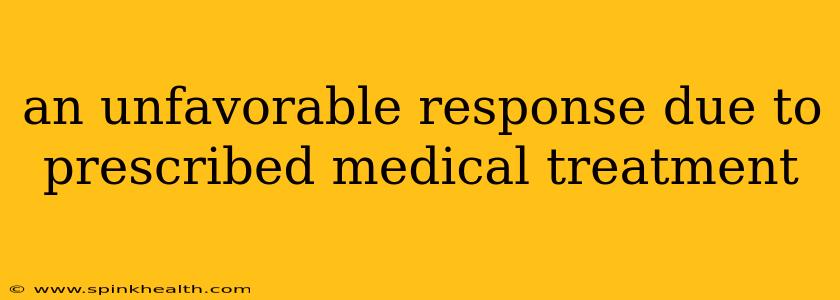An Unfavorable Response to Prescribed Medical Treatment: Understanding and Addressing Adverse Effects
Let's be honest, nobody starts a course of medication hoping for trouble. We go to the doctor, get a prescription, and expect to feel better. But sometimes, things don't go as planned. An unfavorable response to prescribed medical treatment, also known as an adverse drug reaction (ADR) or side effect, is a common occurrence, and understanding it is crucial for both patient safety and effective healthcare. This isn't about blaming doctors or questioning the efficacy of medicine; it's about navigating a challenging situation and finding solutions.
My own grandmother, bless her soul, experienced this firsthand. She was prescribed a new blood pressure medication, and while it did lower her blood pressure, she also experienced debilitating dizziness and nausea. This wasn't simply a minor inconvenience; it significantly impacted her quality of life. Her story highlights the importance of open communication with your healthcare provider and proactive monitoring of your body's response to treatment.
What Constitutes an Unfavorable Response?
An unfavorable response isn't just about mild discomfort. It encompasses a wide spectrum of reactions, ranging from mild annoyances like upset stomach or drowsiness, to more severe consequences such as allergic reactions, organ damage, or even life-threatening complications. The severity varies dramatically depending on the medication, the individual's physiology, and other factors like pre-existing conditions.
What are the common side effects of medication?
This is a broad question, and the answer depends heavily on the specific medication. Common side effects include nausea, vomiting, diarrhea, constipation, headache, dizziness, drowsiness, insomnia, and skin rashes. However, some medications have much more serious potential side effects, so it's crucial to carefully review the information provided by your doctor and pharmacist. Never hesitate to ask questions if you are unsure about anything.
How can I tell if my reaction is serious?
This is vital. Serious reactions often require immediate medical attention. Watch for signs like difficulty breathing, chest pain, swelling of the face, lips, or tongue (anaphylaxis), severe skin reactions (Stevens-Johnson syndrome), or any sudden, significant changes in your health. If you experience any of these, seek emergency medical care immediately.
What should I do if I experience an unfavorable response to my medication?
This is where proactive communication becomes paramount. Don't suffer in silence. Contact your doctor or pharmacist as soon as you notice any unusual symptoms. They can assess the situation, determine the severity of your reaction, and potentially adjust your treatment plan. This might involve changing your medication, adjusting the dosage, or implementing supportive measures to manage the side effects.
Can I stop taking my medication without talking to my doctor?
Absolutely not. Stopping medication abruptly can have serious health consequences, especially with certain drugs. Always consult your doctor before making any changes to your prescription regimen. They can help you develop a safe and effective plan for tapering off the medication if necessary.
What are the long-term effects of an unfavorable response?
The long-term effects depend entirely on the severity and nature of the reaction. Some mild side effects may resolve on their own or with simple adjustments to treatment. However, severe reactions can lead to long-term health problems, requiring ongoing monitoring and management. This highlights the importance of early intervention and careful monitoring of your health.
Navigating an unfavorable response to prescribed medical treatment can be daunting, but remember, you're not alone. Open communication with your healthcare team is essential. By actively monitoring your body's response and promptly reporting any concerns, you can work together to find a solution that optimizes your health and well-being. Your health is a partnership, and your voice matters. Don’t hesitate to advocate for yourself and seek the support you need.

